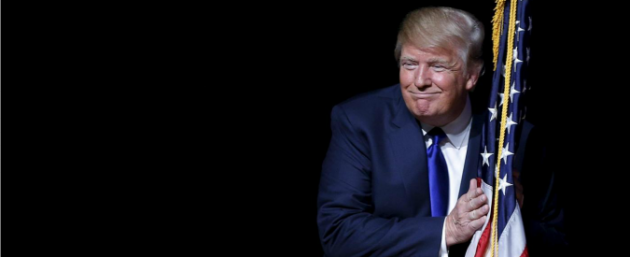
At first it was the hair. The media’s relationship with Donald Trump has never been a peaceful one, and The New York Times has raised doubts in the last year over the authenticity of “The Donald,” leading us to the understanding that the coming presidential election will be neither conventional nor politically correct. The treatment that today’s media reserve for the American billionaire transcends the usual criticism of an opponent and strays toward the most virulent demonization. It goes so far as to compare Trump to Mussolini, Hitler and Peron, and it is not unlikely that the American mainstream will soon be calling him the Antichrist.
The New York magnate has called Mexican immigrants who enter the United States (often illegally) across the Californian border rapists. This situation is very reminiscent of the waves of migration from Eastern to Western Europe, necessary for the cheaper salaries that mid-European businesses yearn for. Yet beyond Trump’s provocations, it is the hysteria of the mainstream American media that comes as a surprise, battling with all its might to stop Trump’s rise as a Republican presidential candidate.
This demonization does not bring good results. Just look at the anti-Berlusconi campaign that the Italian center-left bloc haphazardly carried out in the past, its key tactic being to delegitimize the opponent. It was refuted by the electorate, which promptly went in the opposite direction. The end to this story was Matteo Renzi, a man considered to be a clone of Berlusconi and indispensable for earning the trust of the moderate electorate.
It looks like this same dynamic, perhaps even more fired up, is repeating itself in the United States. The media have opted for the same delegitimization campaign with Trump, who is considered dangerous and unreliable by the lobbyists in the industrial and banking sectors who are financing Hillary Clinton’s campaign. Opposition does not just come from the left of Trump, but also from the neocons. They were the fiercest supporters of the U.S. military campaigns in Iraq and Afghanistan, while Trump has expressed criticism of those wars, and of American military interventions (from the Middle East to Ukraine) that largely increase Washington’s military force.
Since the fall of the Berlin Wall until today, America has profited from the vacuum in foreign policy left behind by the fall of the USSR, allowing the U.S. to greatly extend its influence in Eastern European territories that had been under Soviet control. In the late ’90s, neoconservatism (headed most famously by Paul Wolfowitz and Dick Cheney) came to life. The ideology pushed for the expansion of American influence through higher military spending and an affirmation of global American leadership throughout the world.
Washington Post columnist Charles Krauthammer wrote that they were unrepeatable times for the United States, and that the country was being exploited through the creation of a supranational entity that included the U.S., Europe and Japan. Trump’s view is antithetical to the American neocons’ vision, as he is the spokesman for an isolationist campaign with a foreign policy that would have American troops withdraw from the Middle Eastern theater of war. He would normalize relationships with Putin’s Russia, which other Republican candidates like Jeb Bush and Marco Rubio consider a bitter enemy and make promises to continue the current interventionist policy.
It is an ideology that could not even be stopped during Obama’s presidency, despite a promise in 2008 to put an end to America’s presence in the Middle East. Today America is tangled up in the mess that saw the rise of the Islamic State group, and has a worsening relationship with Russia reminiscent of the worst years of the Cold War.
In some ways Trump is breaking years of continuity between Republicans and Democrats. He seems to be the unwelcome outsider to both sides, who are refusing to acknowledge him as a legitimate opponent, and see him as a vulgar plutocrat and aspiring dictator. The eccentricities of Trump’s character and his offensive statements are not in question here; it is the political and financial establishment’s inability to accept a candidate who dares to deviate from Washington’s usual course of military expansionism, the one that contributed to hugely increased instability in the Middle East, and was largely responsible for spreading Islamic terror.
Trump has all the characteristics the average American likes — the average American who has been disappointed over the years by conventional politicians’ promises to transfer the weight of the state budget to military spending while social inequality constantly increases and speculative finance inflates the unstoppable desire to amass money. Trump’s outbursts against immigrants, his refusal to be politically correct and his capacity to support himself financially leave him freer than his opponents to set the agenda for his electoral campaign, as they have to turn to fundraising campaigns among Washington’s traditional lobbies.
This is probably why he continues to climb in the polls. He is an outsider candidate that pleases the most traditional and national spirit of America based on his continual claim that he draws on the values of the Constitution’s founding fathers. It is this same spirit that does not want to hear talk of restrictions on gun possession (considered a fundamental right for every American citizen). Trump tugs on the most sensitive heart strings of that part of the electorate and cleverly exploits the relationship, including when he responds to the media’s delegitimization campaign. All this promises to make the 2016 American presidential election campaign among the most fiery and interesting in years.

Leave a Reply
You must be logged in to post a comment.